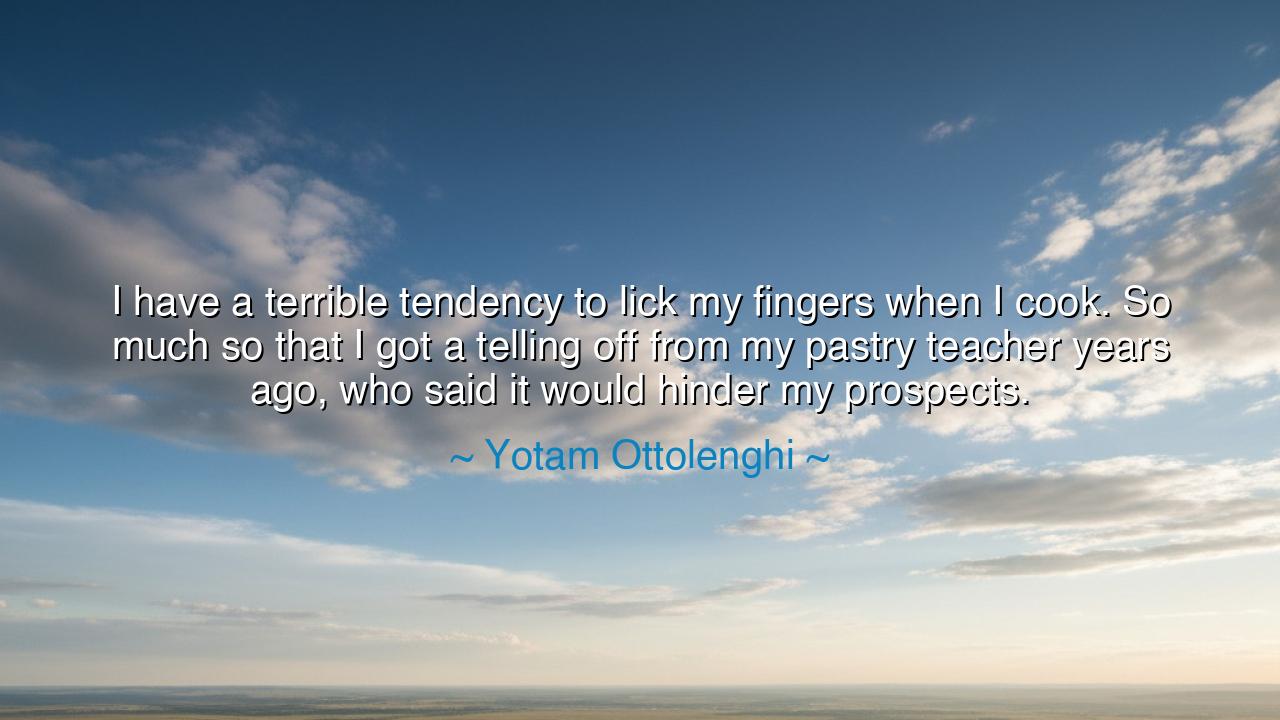
I have a terrible tendency to lick my fingers when I cook. So
I have a terrible tendency to lick my fingers when I cook. So much so that I got a telling off from my pastry teacher years ago, who said it would hinder my prospects.






Yotam Ottolenghi, the master of flavors and textures, once confessed with humility: “I have a terrible tendency to lick my fingers when I cook. So much so that I got a telling off from my pastry teacher years ago, who said it would hinder my prospects.” Though spoken lightly, these words carry a truth that resonates far beyond the kitchen. They speak of discipline, of the tension between instinct and craft, and of how even small habits can shape or hinder the path to mastery.
The meaning of this reflection lies in the eternal struggle between desire and restraint. To lick the fingers is natural — a gesture of delight in the sweetness of creation, a surrender to the pleasure of taste. Yet the teacher reminds us that mastery demands discipline, that the craftsman must rise above impulse in order to preserve standards, hygiene, and professionalism. In this small anecdote is hidden the great truth: that greatness is not only about passion, but about the ability to channel passion into form without being ruled by it.
The origin of such wisdom belongs to all crafts. In every art, there are instincts that must be tempered. The painter longs to overwork the canvas, the musician to rush the tempo, the speaker to indulge in words beyond measure. But the mentor steps in, guiding the student with stern correction, teaching them that freedom comes not from indulgence but from discipline. Ottolenghi’s pastry teacher, like the wise masters of old, understood that unchecked habits, however small, can ripple outward and shape the course of a career.
History gives us countless examples of this truth. Consider the great composer Beethoven, whose passion was unrestrained, often wild. Yet his genius was elevated not by impulse alone, but by the years of training and structure that gave form to his emotional fire. Or think of the Japanese tea masters, whose rituals of precision and restraint transformed the simple act of drinking tea into an art of serenity and dignity. In each case, greatness was forged not only by natural passion, but by the steadying hand of discipline.
Ottolenghi’s anecdote also carries a lesson about mentorship. The teacher does not always applaud; sometimes they must rebuke, for love of the craft and for the good of the student’s future. The correction may sting in the moment, but it plants seeds of growth. Just as a gardener prunes a tree to ensure its strength, so too does a teacher’s rebuke guide the student toward flourishing. That single telling-off, remembered years later, became part of the story of Ottolenghi’s journey — a reminder that even the greatest chefs are shaped by moments of humble correction.
The lesson for future generations is profound: do not despise correction, even for small things. The habits that seem trivial today may determine whether your work rises to greatness or falters in mediocrity. Passion is essential, but discipline refines passion into mastery. True growth comes when we listen to those who see further than we do, even when their words cut against our impulses.
Practical actions flow naturally from this teaching. Cultivate awareness of your habits, for they shape your future more than you may realize. Welcome correction, not as insult, but as guidance. When tempted to indulge in small impulses, remember that restraint builds strength. And in whatever craft you pursue — whether cooking, writing, teaching, or building — balance your natural joy with the discipline of art. For in this union lies true excellence.
Thus, Ottolenghi’s lighthearted confession becomes a parable for all: delight must be tempered with discipline. The sweetness of passion is beautiful, but it must be shaped by the stern wisdom of art. Let us then honor our teachers, heed their rebukes, and walk the path of mastery not by impulse alone, but by the steady blending of nature and discipline. For in that harmony lies the making of greatness.






AAdministratorAdministrator
Welcome, honored guests. Please leave a comment, we will respond soon